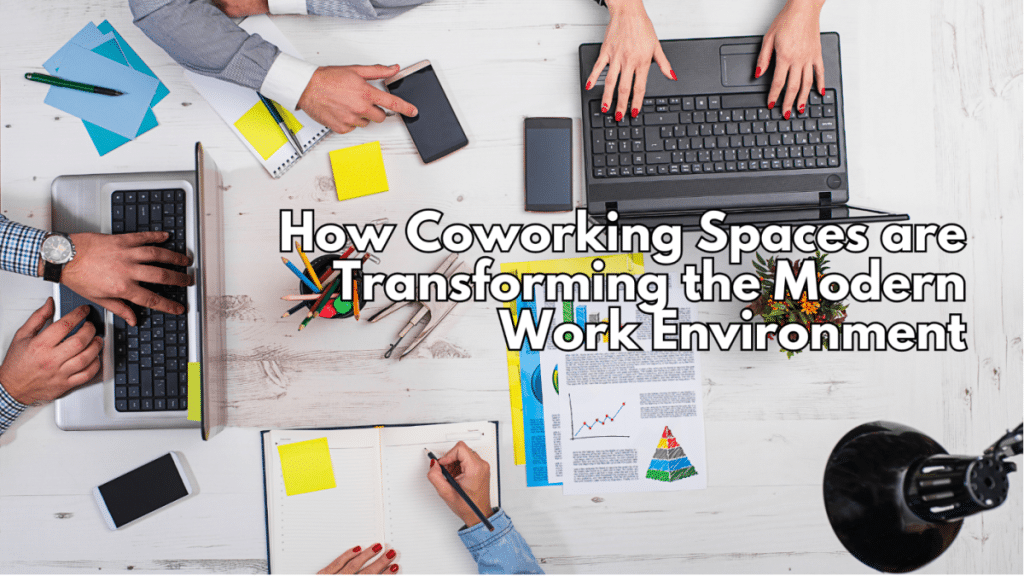Do you know that work can be flexible, collaborative, and productive all at once? Coworking spaces help modernize and elevate the traditional work environment, with flexible, adaptable spaces designed for freelancers, startups, and even large corporations. From architecture to ambiance, coworking environments are consciously designed to inspire creativity and efficiency.
As more people shift to hybrid or fully remote setups, coworking spaces provide structure and productivity for professionals across various industries. In this blog, we’ll explore the benefits and unique attributes of coworking spaces, along with why these spaces continue to gain traction.
Coworking in a Bustling City
Whether it’s in a bustling metropolis or a suburban area, coworking spaces are helping redefine work culture. By providing convenient, equipped spaces, these hubs are revolutionizing not only where people work but how they interact, collaborate, and contribute to their industry.
Coworking spaces offer a dynamic environment that suits a wide range of professionals, especially in bustling cities like Dallas, where flexible workspaces are in demand. For businesses exploring coworking dallas options, these spaces provide networking opportunities and productivity-enhancing amenities that are often unavailable in traditional office settings, making them an ideal solution for today’s workforce.
- Convenience and Accessibility: Because coworking places are available all over the city, professionals can easily find centrally located spaces near transportation, dining, and other amenities.
- Variety of Amenities: Coworking spaces offer high-speed internet, on-site cafes, and many other amenities, which generally make them more attractive than the traditional office or home office.
- Networking Opportunities: Coworking spaces remain quite open to different types of professionals in different industries who work together and build strong bonds among themselves.
Benefits of Coworking Spaces
Coworking spaces have seen surging popularity not just through freelancers and startups, but also corporate teams, the big businesses. Here are reasons why coworking space impacts the traditional work format or system and increases efficiency, productivity, and value generated:
Flexibility and Cost-Effectiveness
Coworking spaces allow for flexibility in terms of renting. Members can opt for a daily, monthly, or annual plan with no long-term commitment. This is a benefit to startups and small businesses that are not ready to commit to expensive leases.
- Flexible rental options
- Sharing costs of office utilities
- No long-term commitment required
Promotion of Innovation and Collaboration
Coworking spaces foster community, which creates collaboration. Shared spaces such as lounges and breakout rooms are often part of the spaces that make it possible for collaboration and networking to become daily experiences.
- Open-plan space encourages interaction.
- Regular network events and mixers
- Diverse backgrounds breed innovations.
Amenities and Professional Support
Another key attraction of coworking spaces is the diversity of amenities. Such spaces are furnished with modern furniture, high-speed internet, and professional support services that make work easier and more comfortable. Compared to traditional offices, coworking spaces are also better positioned to change rapidly with changes in technology and needs in the workspace.
Advantages of the Amenities Provided
The amenities can be quite extensive, but a few are meeting rooms, a phone booth, mail handling services, and, in some, complimentary coffee. These facilities have created a professional space especially appealing to those needing more than what a home office can provide.
- Private meeting rooms for client meetings
- Breakout spaces for brainstorming
- Reception and mail services for business

Increasing Productivity and Welfare
Coworking spaces are usually equipped with wellness initiatives and ergonomic furniture, maintaining a positive working environment while also making it more comfortable and health-conscious. The design of coworking spaces is mainly focused on productivity, quiet zones, greenery, natural lighting, and ergonomic furniture to help workers stay focused and healthy.
How Coworking Spaces Improve Productivity
Many studies show that environmental change has a positive effect on productivity. Workers entering an environment designed for comfort and efficiency are more likely to stay focused and experience reduced stress.
- Natural light and flora for reduced stress
- Ergonomic furniture for body health
- Quiet areas designed for focused work
Why Coworking Works in Other Sectors
Coworking space has shown that its effectiveness is advantageous in any sector. Here’s why different sectors benefit from coworking spaces for maximum productivity and growth:
Creative Industry
Coworking spaces are alternatives to traditional offices, offering creative professionals a change of scenery and design-driven environments and an opportunity to meet other like-minded individuals.
Technology and Startups
Coworking space for tech startups is a facility that offers flexibility, scalability, and professionalism. This can expand or downsize as required by the demands of a project and team size.
Remote Teams and Freelancers
Freelancers and other remote workers enjoy easy access to a business community for a fraction of the cost of renting an office. Coworking provides them with an environment that is more like a community yet offers independence.
The Growing Popularity of Coworking Spaces
With maturity in the coworking spaces, their perception has also changed with time. Coworking is no longer just for start-ups or freelancers but is now increasingly becoming the choice for companies of all sizes. Scalability, flexibility, and a community environment make all the difference between well-established corporations and solo entrepreneurs seeking cost-effective yet dynamic solutions for their workplaces.
Coworking Space Features and Trends
Some of the latest trends that define coworking spaces in this modern work environment include:
- Eco-conscious values are reflected through sustainable design elements.
- Hybrid spaces: private offices and open workspaces
- Technology integration, including advanced booking systems, and secure Wi-Fi networks, among others
Frequently Asked Questions
1. How does a coworking space differ from a regular office?
Coworking spaces offer flexible leases, shared amenities, and a community-oriented environment. They are flexible and can accommodate different working styles, unlike traditional offices, which are often rigid and isolated.
2. Can large companies use coworking spaces?
Yes, larger companies are increasingly using coworking spaces for temporary projects, client meetings, and hybrid work arrangements, which can provide flexibility and cost savings.
3. Do coworking spaces help increase productivity?
Absolutely. A majority of coworking spaces have been designed to be effective for productivity. There is ergonomic furniture, quiet zones, and natural light for users focused and contented at work.
Conclusion
Coworking spaces have transformed the modern working space in many ways. These spaces are flexible and comforting, which is very different from what one may get in traditional offices. With their range of professional benefits, coworking spaces have become essential to the evolving work environment, where individuals connect and support each other in achieving their goals productively.
